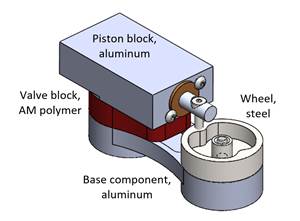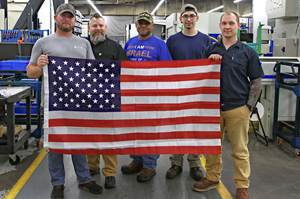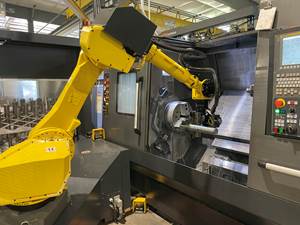Job Shop Cuts Cables to Save Time on Data Transfers
At Stollen Machine & Tool Co., uninsulated cables could not reliably transport CNC programs from the computer to the machines. Six wireless RS232 units from Shop Floor Automations have resulted in 15 percent daily time savings.
Share





In a job shop, a factor that may seem trivial can have a big impact on overall production efficiency. For Doug Stollen, owner of Stollen Machine & Tool Co., that factor was the cable connection he used to transport CNC programs from his computer to the machines on his shop floor. When he realized how much time he was losing due to their unreliability, he invested in six wireless data-transfer systems from Shop Floor Automations (La Mesa, California). Mr. Stollen says this simple change has saved him 15 percent of his time per day.
Stollen Machine & Tool Co. of Kenilworth, New Jersey, is a fourth-generation, family-owned job shop that was founded in 1954. According to Mr. Stollen, the shop specializes in larger, more complex projects that cannot be sent overseas or done cheaply. He says the shop’s products must be made in America because the work is more involved and customers like to come in to check how work is progressing during the different stages of production.
As technology advanced over the years, Stollen Machine transformed with it. To keep his shop thriving, Mr. Stollen is committed to updating old, outdated and unreliable technology such as the flawed cable system for transferring data. Often, when he transferred CNC programs made on his office computer to the machines on the shop floor, only parts of the code would make it to the machine. Other times, none of the code would make it to the machines. “Sometimes the cables would just stop working completely,” he says. Problems with the cables worsened during the summer, when the weather was hot and humid.
According to Mr. Stollen, he was losing productive hours every day dealing with the problem and wondering if he would be able to send and receive these vital programs. He was second-guessing everything and looking through the code every time it did reach the machines, he says.
Knowing that the age of the machines was not the issue, he began researching solutions to his cabling problem. He compiled information he found online about the cost to have a team of people set up new, better-insulated CAT5 cables versus the cost to make the leap to wireless. Ultimately, he decided to replace the cable system with six RS232 wireless units from Shop Floor Automations that enable users to connect the machines to wireless networks for transferring data. The units are designed to withstand industrial environments, and he installed them on six different machines in a single day.
RS232 is a standard for serial communication transmission of data. It formally defines the signals between data-terminal equipment, such as a computer terminal, and data-circuit-terminating equipment, such as a modem. The RS232 standard is commonly used in computer serial ports, and it is one of the communication interfaces installed on CNC machines that allow them to upload and download data.
With the new wireless system, programs are fully transferred from the computer to the machine every time, and Mr. Stollen does not have to check the code multiple times to ensure it has completely transferred. “I would say it saves me around 15 percent of my time every day,” he estimates.
The wireless units came with some additional benefits as well. For instance, Mr. Stollen did not have to pay to replace the shop’s cable infrastructure, and he did not have to increase his insurance to replace the cables. He also notes that he did not have to downsize his manpower to afford new machines or equipment.
The wireless data transmitters give him more peace of mind. “It saves me all that extra work of having to worry about whether the codes are coming through correctly or not,” he says.
Related Content
Solve Worker Shortages With ACE Workforce Development
The America’s Cutting Edge (ACE) program is addressing the current shortage in trained and available workers by offering no-cost online and in-person training opportunities in CNC machining and metrology.
Read MoreThe Power of Practical Demonstrations and Projects
Practical work has served Bridgerland Technical College both in preparing its current students for manufacturing jobs and in appealing to new generations of potential machinists.
Read MoreFinding Skilled Labor Through Partnerships and Benefits
To combat the skilled labor shortage, this Top Shops honoree turned to partnerships and unique benefits to attract talented workers.
Read MoreSame Headcount, Double the Sales: Successful Job Shop Automation
Doubling sales requires more than just robots. Pro Products’ staff works in tandem with robots, performing inspection and other value-added activities.
Read MoreRead Next
Machine Shop MBA
Making Chips and 91ÊÓƵÍøÕ¾ÎÛ are teaming up for a new podcast series called Machine Shop MBA—designed to help manufacturers measure their success against the industry’s best. Through the lens of the Top Shops benchmarking program, the series explores the KPIs that set high-performing shops apart, from machine utilization and first-pass yield to employee engagement and revenue per employee.
Read MoreAMRs Are Moving Into Manufacturing: 4 Considerations for Implementation
AMRs can provide a flexible, easy-to-use automation platform so long as manufacturers choose a suitable task and prepare their facilities.
Read MoreLast Chance! 2025 Top Shops Benchmarking Survey Still Open Through April 30
Don’t miss out! 91ÊÓƵÍøÕ¾ÎÛ's Top Shops Benchmarking Survey is still open — but not for long. This is your last chance to a receive free, customized benchmarking report that includes actionable feedback across several shopfloor and business metrics.
Read More























